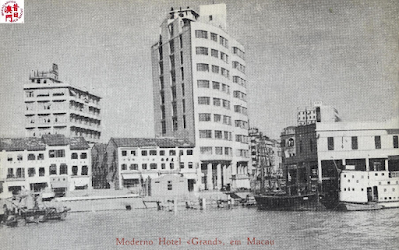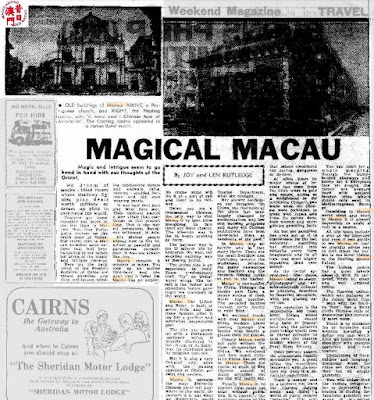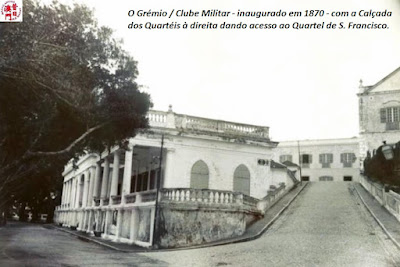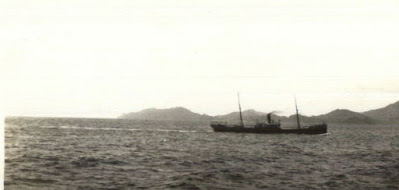sexta-feira, 31 de março de 2023
"Magical Macau"
quinta-feira, 30 de março de 2023
Estrangeiros, portuguezes e macaistas no séc. 19
quarta-feira, 29 de março de 2023
Cathay and the Way Thither
terça-feira, 28 de março de 2023
segunda-feira, 27 de março de 2023
Rosenstock's Gazetteer and Commercial Directory of China: 1920
Rosenstock's Gazetteer and Commercial Directory of China, 1920(clicar nas imagens para ver em tamanho maior)
domingo, 26 de março de 2023
From Calcutta to Canton (and Macao): 2ª parte
Nearly three centuries elapsed before his countrymen placed this memorial of him in the garden in which he had spent so many happy hours. There are some other monuments scattered about the garden one to the memory of Mrs John Theophilus Metcalfe whose husband spent six years in China. On the wall of the Casa grounds overlooking the inner harbour still remains the Observatory in which the scientific officers of La Perouse's squadron made Astronomical observations in January 1787. Among former residents in Macao was the Rev Dr Robert Morrison of world wide reputation as a Missionary and linguist. His great work the Chinese and English Dictionary was printed at Macao under the auspices of the East India Company.
Another remarkable resident was George Chinnery by birth, an Irishman by profession, an Artist whose works in portraits crayon sketches and paintings in oil are well known in Calcutta where he arrived in 1807. There are some fine specimens of his portraits in Government House and in the High Court Calcutta and his pencil and pen and ink sketches of native life and character are inimitable. Chinnery was a clever genial man but he was unhappily mated and was besides in trouble with his creditors so he disappeared from Calcutta and came to Macao where after a residence of 27 years he died on the 30th May 1852.
sábado, 25 de março de 2023
From Calcutta to Canton (and Macao): 1ª parte
sexta-feira, 24 de março de 2023
"Chinese Coolies Destined for Cuba Escaping from the Depot at Macao"
 |
quinta-feira, 23 de março de 2023
Cartas da Índia e da China: 1815 a 1835
A obra em dois volume teve várias reedições ao longo dos tempos. A primeira é de 1843. A das imagens é de 1847 (Imprensa Nacional, 2 vols.).
Pictures above are from the Second edition, by Imprensa Nacional, in 1847. The 2 vols. include twelve lithographed portraits and one wood cut. This account, which is written in 100 letters, discusses the history, customs, and present state of India, and China, especially Macao, and is based on the author's travels there. It also gives a history of the Portuguese discoveries, settlement and trade in the Far East. The lithographed plates include portraits of Chinese emperors, and portraits of the author and his wife. Andrade, born in the Azores in 1780, made numerous voyages to India and China.
José Inácio de Andrade nasceu nos Açores em 1780 e morreu em Lisboa, em 1863. Como oficial da Armada fez várias viagens à Índia e à China. Foi vereador e presidente da Câmara Municipal de Lisboa e figura destacada das letras portuguesas da época, deixando vasta obra. Publicou, por exemplo, uma curiosa Memória intitulada sobre a destruição dos piratas da China e o desembarque dos ingleses na cidade de Macau e sua retirada, em 1835, que aborda dois temas significativos da história de Macau, a luta dos portugueses, com os imperiais chineses, contra a pirataria e a tentativa de ocupação de Macau pelos ingleses, sob o pretexto da guerra napoleónica, em que, portugueses e chineses se opuseram, em conjunto, ao ataque britânico.
Reprodução de uma das cartas (sobre Macau)
Carta XXXII
Estado actual de Macau
«Artigo 1.° – É proibido, da data deste em diante, aos portugueses admitirem japoneses em Macau.
Artigo 2.° – É igualmente proibido aos portugueses comprar súbdito algum do império chinês.
Artigo 3.° – É proibida a entrada de navio algum no porto de Macau, sem preceder medição, a fim de pagar o imposto que a lei exige.
Artigo 4.° – Era castigado rigorosamente qualquer contrabandista, além de perder os objectos apreendidos.
Artigo 5.° – É proibido aos portugueses edificar novos prédios, sob pena de serem arrasados: mas podem reedificar os antigos.»
Talvez sem a colocação deste monumento nos Paços do Concelho desta cidade não pudessem levantá-los os ilustres varões que os legaram a seus netos.
Assim como o governo chinês é singular, assim deve ser o governo desta cidade em tudo dependente da China. Além dos requisitos necessários para bem governar outro qualquer estabelecimento, precisam-se neste os seguintes: 1.° — verdadeiro conhecimento dos costumes chineses, para não os afrontar; 2.°-consumada prudência para tolerar o desaforo de quem sofre e sustenta homens estranhos em sua terra; 3.° – manter poucos e bons soldados, isto é, robustos e bem disciplinados. Em outro qualquer lugar, seria conveniente um corpo respeitável pela força bruta: em Macau torna-se prejudicial, já pela maior despesa, com que a cidade não pode, já para não ferir o orgulho dos chineses.
É irrisório ver o chefe de duzentos canarins, estacionado nas portas do mar (2) do império chinês, provocar a ira de cento e cinquenta milhões de tártaros à frente de duzentos milhões de chineses. O ministério português esteve sempre vendado acerca deste nosso estabelecimento. Os capitães gerais, não satisfeitos com os antigos privilégios, pediram à Senhora D. Maria I providências para si, e foram-lhe remetidas pela ignorância (em matérias de governo) do bispo confessor, e de Martinho de Mello, que, pouco tempo antes, havia deixado a patriarcal.
Macau é dependente dos chineses por muitas razões: a mais essencial é não produzir alimento algum para sustentar-se. Bastará saber-se que, não tem pasto para duas vacas, nem possui uma só embarcação de pesca. Também não é pequena dependência não poderem seus habitantes renovar uma telha da sua casa sem licença do mandarim, em virtude de não haver em Macau, pedreiro, carpinteiro, ferreiro, etc., que não seja chinês: e estes não trabalham em casa portuguesa sem licença do mandarim.
Acresce a isto, não haver nesta cidade padejo, mercearia ou taberna que não seja dos chineses: os donos, e os artistas, ao verem afixar um edital em nome do imperador para que deixem a cidade, bastam vinte e quatro horas, para de dezoito mil chineses não ficar um em Macau.
Que fará neste caso o capitão-geral? Onde irá buscar alimento para quatro mil e quinhentas pessoas? (3) Que recurso fica ao provocador? Pedir misericórdia, por via do Senado, ao vice-rei de Cantão, a fim de não perecerem à míngua de alimento.
Assim, vês que o governo desta cidade exige muitos conhecimentos especiais e grande prudência. Em todas as épocas anteriores, quem pôs Macau no risco de perigar foram os capitães-gerais, e quem o salvou foi o Senado; isto é, foram os conhecimentos especiais e a prudência dos cidadãos macaenses.
A parte mais essencial deste governo consiste em conservar amizade franca e sincera com as autoridades chinesas e não quebrar as leis do império em relação com a cidade: este requisito é de fácil desempenho ao Senado, já por ser o procurador considerado como autoridade chinesa, já por serem os vereadores os mais interessados na propriedade do estabelecimento.
O capitão-geral deve ocupar-se na disciplina dos soldados, e no emprego deles, em virtude de ordem emanada do Senado. Presida a ele muito embora, quando ali se tratar de negócios políticos, tenha um só voto, pois tem uma só cabeça: seja esse emprego conferido ao capitão-geral como são todos os mais do reino; porém, tenha o Senado faculdade para o demitir, quando abusar da força que se lhe entregou ou infringir as leis: fique o
Senado responsável se a demissão não tiver a razão e a justiça por fundamento.
A Ouvidoria não é agora mais precisa do que em 1588, época em que os macaenses pediram a Filipe II a sua extinção; graça que só vieram a obter no reinado do Sr. D. João IV, no ano de 1642. Haja na cidade um juiz de direito, mas sem ingerência na administração dos fundos públicos. Governe o Senado da Câmara por suas leis, anteriores às providências de 1784, enquanto o poder legislativo não fizer outras melhores.
Oxalá o governo de Portugal chegue a conhecer e a ordenar o que muito convém a este nosso estabelecimento; isto é, a conceder-lhe o que seus moradores pediram em 1821 ao Sr. D. João VI: 1.° a sua forma de governo antigo, acomodado à doutrina da constituição moderna; 2.° a dissolução do batalhão, substituindo-lhe a guarda antiga; 3.° a suspensão das despesas feitas com Timor e Goa (4); 4.° preferir nos empregos militares e civis, os portugueses casados ou nascidos em Macau (5).
Com esta reforma, discutida, votada e pedida pelos mais conspícuos cidadãos macaenses: Pereiras, Paivas, Almeidas, Pegados, Limas, Sarros, Marques, Georges, Cortelas, Figueiredos, Lemos, e outros, entraria de novo em Macau a paz e a fortuna que dele fugiu há vinte anos. O desgoverno de Portugal, chegando a este país, motivou, além de outros males, emigrações que levaram consigo grande parte da fortuna pública.
A nenhum outro estabelecimento português é mais bem aplicada a epígrafe desta carta do que aos beneméritos e fiéis macaenses. Camões, em seus versos, fala com experiência adquirida entre eles. Tive a satisfação de fazer os apontamentos para esta carta sentado na gruta onde o nosso poeta compôs os Lusíadas.
(1) Chi-Tsoung foi quem cedeu Macau aos portugueses em 1557. Mo-Tsoung, que reinou de 1567 a 1572, conservou aos portugueses a posse que lhes dera seu pai. Chin-Tsoung, filho de Mo-Tsoung, foi quem deu o grau de mandarim ao procurador da cidade em 1584 e o referido decreto em 1614.
(2) Macau, no idioma chinês, significa: portas do mar
(3) Pelo último censo havia em Macau: europeus e mestiços … 1.620
Mulheres cristãs de várias raças e cores … 2.700
Soldados canarins …180
Total dos cristãos … 4.500
Chineses, dos dois sexos, residentes em Macau … 18.000
Total dos habitantes desta cidade … 22.500
Alguns escritores elevaram a sua povoação a mais de cinquenta mil vizinhos: enganaram-se.
(4) Colónias que não rendem para si, devem abandonar-se a seus recursos. Quando não, pagam assim os que têm virtudes para nutrir viciosos.
(5) Em 1835 eram ainda constantes no seu pedido.
quarta-feira, 22 de março de 2023
Emissão filatélica "Fortalezas de Macau"
terça-feira, 21 de março de 2023
"Hotel Kuok Chai também conhecido por Grand Hotel"
 |
| Foto de 1945 |
 |
| Foto Fabricio Croce |
Tinha três designações: Grande Hotel (português), Grand Hotel (inglês) e Kuok Chai (Tai Chan Tim), em chinês -國際大酒店. Ao total tinha 97 quartos, salão de dança no 1º andar, cabeleireiro e salão de chá no último andar - chegava-se de elevador - onde a vista sobre a cidade e as ilhas em redor, nomeadamente a Lapa, era de cortar a respiração, segundo relatos da época.
Na inauguração esteve presente o Governador de Macau, Gabriel Maurício Teixeira, e Sir Robert Ho Tung, que se deslocou de Hong Kong expressamente para o efeito.
 |
| Publicação do final da década de 1950 |
O hotel pertencia à família Fu que detinha na altura o monopólio do jogo. Foi projectado pelo engenheiro civil macaense João Canavarro Nolasco e Chan Kwan Pui em 1937 e construído pelo empreiteiro Tai Man Hou. Para a época apresentava linhas modernas características da corrente art deco: "O edifício articula‐se a partir de um corpo central, constituído pela torre que se estende a uma altura equivalente a 12 pisos (ca. 40 metros). De cada lado da torre, sobressai o corpo dos quartos que parecem suspensos na fachada."
A empresa que o explorou foi a Heng Vo, sociedade por cotas criada na altura com o capital social de cem mil patacas, divididas em partes iguais pelos dois sócios: Fok Pen Heng e Ung Heng Ip. Estava encerrado desde 1996.
 |
| Documento de Fevereiro de 1941 |
segunda-feira, 20 de março de 2023
"The city of calm and of the past"
The first thing an European landing at Macao in olden times did was to go and see the Chinese Pagoda at the Rocks. He could wend his way there and back in a tanka or native boat or he could stroll there by the sea side. Now we can visit pagodas of far more imposing aspect and dimensions; nay, we even meet one that far surpasses it on his way the great Pagoda of Singapore. But if the temple Macao is poor and badly kept its position is picturesque. The inner harbour with its legion of junks and tankas lies at its feet above it are huge blocks of granite and secular trees whose vigorous roots fasten in the crevices while close by are kiosks and little oratories in honour of inferior divinities. On the portico is a great junk painted in red and there is an inscription in Chinese on the neighboring rock. The air of respectable antiquity presented by the old Portuguese settlement of Macao is refreshing after the parvenu character with which its ostentatious magnificence invests Hong Kong.
The narrow streets and grass grown plazas the handsome facade of the fine old cathedral crumbling to decay the shady walks and cool grottoes once the haunts of the Portuguese poet, his tomb, and the view from it all, combine to produce a soothing and tranquilising effect. Hong Kong represents the commercial and political movement of the present. Macao is the city of calm and of the past.
 From the top of a great stone arbour in the old palace garden we had a fine view the old town and both harbours the inner and the outer. We came back through the Chinese town where with restless activity mechanics were working at their respective trades. Shopmen were doing a thriving business while barbers never were busier and your barber is an important personage here as elsewhere as such a man needs must be where every man has his head shaved twice a week.
From the top of a great stone arbour in the old palace garden we had a fine view the old town and both harbours the inner and the outer. We came back through the Chinese town where with restless activity mechanics were working at their respective trades. Shopmen were doing a thriving business while barbers never were busier and your barber is an important personage here as elsewhere as such a man needs must be where every man has his head shaved twice a week. As ilustrações têm como título: The Landing Place at Macao e The Pagoda of the Rocks at Macao, representando o Porto Interior na zona do Pagode da Barra.






























